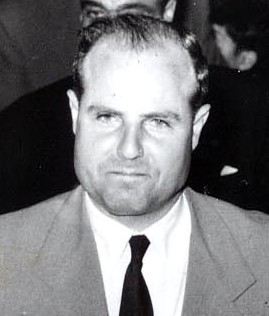
The Kataeb Party, officially the Kataeb Party – Lebanese Social Democratic Party, also known as the Phalangist Party, is a right-wing Christian political party in Lebanon founded by Pierre Gemayel in 1936.

Amine Pierre Gemayel is a Lebanese politician who served as the eighth president of Lebanon from 1982 to 1988.
The Qornet Shehwan Gathering is a Lebanese political organization, comprising politicians, intellectuals, and businesspeople, mostly Christian and ranging in ideology from the centre-right to the centre-left. The organization is not a political party in the classical sense: its members belong to, and in some cases lead, a variety of political parties. It is more of a loose coalition, although whether it intends to organize electorally is unclear. The coalition adheres to seven principles and pursues five objectives.

The Lebanese Forces is a Lebanese Christian-based political party and former militia during the Lebanese Civil War. It currently holds 19 of the 128 seats in Lebanon's parliament, being the largest party of the country.

Pierre Amine Gemayel was a Lebanese politician in the Kataeb Party, also known as the Phalange Party in English.

William Amine Hawi was a Lebanese commander of the Kataeb Party, better known in English as the Phalange, a right-wing Christian political party in Lebanon.
Antoine Ghanem was a Lebanese politician and an MP in the Lebanese Parliament. He was also a member of the Kataeb party and the March 14 Coalition. He was murdered on 19 September 2007 in a car bomb explosion in the Sin el Fil suburb of Beirut. He was the eighth anti-Syrian figure assassinated since the assassination of Rafik Hariri on 14 February 2005.
Camille Khoury, is the Free Patriotic Movement representative in the Matn riding near Beirut, Lebanon. In August 2007, Khoury was elected in Matn over former Lebanese president Amine Gemayel by a margin of 418 votes. The official tally was 39,534 against 39,116 for Gemayel. The seat had been vacant since the murder of Pierre Amine Gemayel, who was killed in an attack in Lebanon earlier that year.

Nadim Bachir Gemayel is a Lebanese politician and member of the Lebanese parliament since 2018. He is a member of the Kataeb party that was founded by his grandfather Pierre Gemayel and is the son of the assassinated president-elect Bachir Gemayel.

Samy Amine Gemayel is a Lebanese politician, lawyer and a member of the Lebanese parliament. Being elected as party president in 2015, he presently serves as the seventh leader of the Lebanese Kataeb Party which was founded by his grandfather, Pierre Gemayel. He is a critic of the Free Patriotic Movement and Hezbollah. In his youth, he took part in pro-independence protest movements against the pro-Syrian political parties. He has called for the implementation of UN resolution 1559 in Lebanon.

Bachir Pierre Gemayel was a Lebanese militia commander who led the Lebanese Forces, the military wing of the Kataeb Party, in the Lebanese Civil War and was elected President of Lebanon in 1982.

The Armenian Revolutionary Federation, also known simply as Tashnag, is an Armenian political party active in Lebanon since the 1920s as an official political party in the country after having started with small student cells in the late 1890s and early 20th century.
The Kataeb Regulatory Forces – KRF or Forces Régulatoires des Kataeb (FRK) in French, were the military wing of the right-wing Lebanese Christian Kataeb Party, otherwise known as the 'Phalange', from 1961 to 1977. The Kataeb militia, which fought in the early years of the Lebanese Civil War, was the predecessor of the Lebanese Forces.
General elections were held in Lebanon on 15 April 1951, with a second round in some constituencies on 22 April. Independent candidates won the majority of seats. Voter turnout was 54.7%. The governing party, Constitutional Bloc, did not have a clear organization, so it is difficult to determine the number of its members who participated in this election. Nonetheless, the government backed three "Constutional" lists in Mount Lebanon and had 14 of their 22 candidates elected. Former Constitutionalist minister Camille Chamoun became an opposition candidate in an alliance with Kamal Jumblatt.

General elections were held in Lebanon on 6 May 2018. Although originally scheduled for 2013, the election was postponed three times in 2013, 2014 and 2017 for various reasons, including the security situation, the failure of the Parliament to elect a new President, and the technical requirements of holding an election. A new electoral law adopted in 2017 provides a proportional representation system for the first time.

Voting to elect eight members of the Lebanese parliament took place in the Beirut I district on March 24, 1968, part of the national general election of that year. The constituency had 98,439 eligible voters, out of whom 28,631 voted. The elections in Beirut I passed smoothly without violent incidents.

Beirut I is an electoral district in Lebanon. The district elects eight members of the Lebanese National Assembly – three Armenian Orthodox, one Armenian Catholic, one Greek Catholic, one Greek Orthodox, one Maronite and one Minorities.

General elections were held in Lebanon on 15 May 2022 to elect all 128 members of the Lebanese Parliament. The country has for several years been the subject of chronic political instability as well as a serious economic crisis aggravated by the 2020 explosions that hit the Port of Beirut and faced large-scale demonstrations against the political class.
An indirect presidential election was held in the Parliament of Lebanon on 21 September 1982, resulting in Kataeb politician Amine Gemayel being elected President of the Lebanese Republic.
Mounir El Hajj is a Lebanese politician and lawyer who headed the Kataeb Party from 1999 until 2001.













